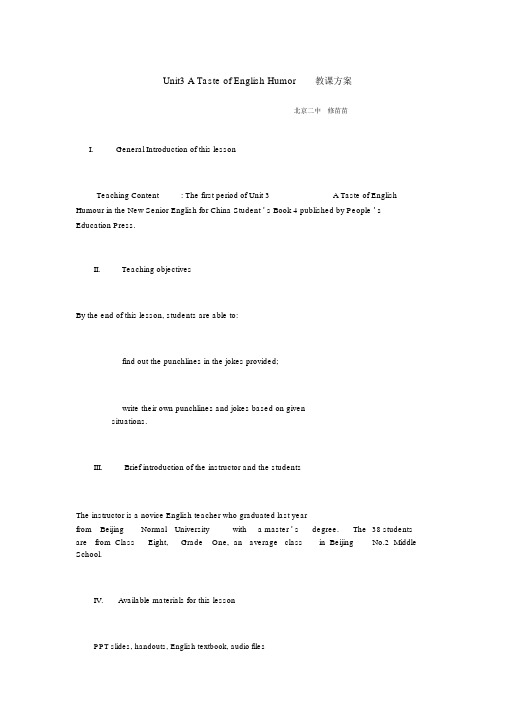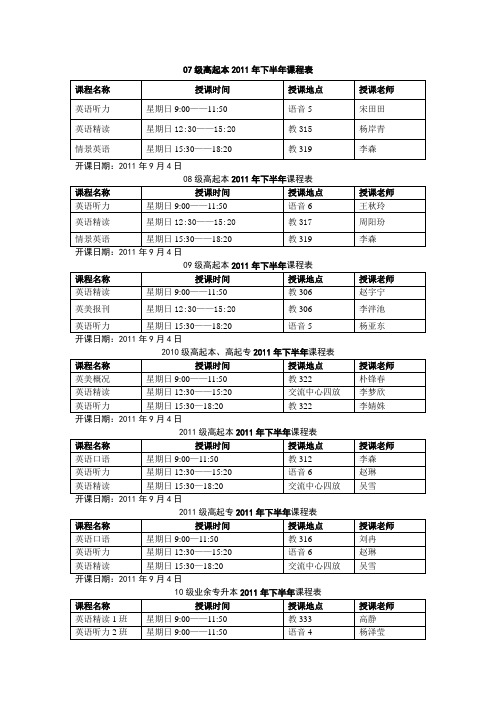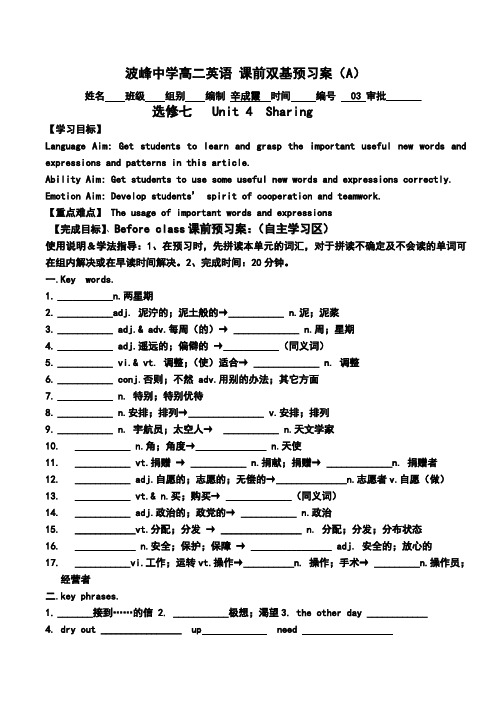English 4尚绪玲
- 格式:doc
- 大小:6.23 MB
- 文档页数:2

Unit3 A Taste of English Humor教课方案北京二中修苗苗I.General Introduction of this lessonTeaching Content: The first period of Unit 3 A Taste of English Humour in the New Senior English for China Student ’ s Book 4 published by People ’ s Education Press.II.Teaching objectivesBy the end of this lesson, students are able to:find out the punchlines in the jokes provided;write their own punchlines and jokes based on givensituations.III.Brief introduction of the instructor and the studentsThe instructor is a novice English teacher who graduated last yearfrom Beijing Normal University with a master ’ s degree.The38 students are from Class Eight,Grade One, an average class in Beijing No.2 Middle School.IV.Available materials for this lessonPPT slides, handouts, English textbook, audio filesV.Teaching proceduresStep One: Warming up (5’)T: As the title suggests,in this unit we are going to taste some English humour. But first I want you to think about one question: How manytypes of English humour are you familiar with? You can discuss it with your partner.Ss will be given one minute to have a discussion.T:Ok, now let ’ s look at two pictures which will help you work out thisquestion. (mime and comedy)T: Besides these two types,there is still one type of humour in written forms, that is, English jokes. So today we will focus on the thirdtype.Purpose : to activate students ’background knowledge of English humour and arouse their interest.T: Now let ’ s taste an English joke together.After reading it,I would like you to find out the sentence that makes the story funny.And also try to explain the story in your own words.T: For this kind of sentences which makes the whole story funny, wehave a name for them, that is, punchline. Ok, now let ’ s read the definition ofpunchline together.Purpose : to elicit the term punchline and help Ss understand thefunction of punchlines which lays a foundation for the next step,that is, to find out punchlines in different jokes by themselves.Step Two: Reading (5’)T:Read the four jokes on the handout and underline the punchlinesin each one of them.T:Now discuss with your partner why they are funny. Try to useyour own words to explain them.Purpose : to lead students to find out punchlines in different jokesbased on what they ’ ve learnt in the first part.Step Three: Reading and Matching (7 ’)T: Read the five stories and choose the best punchlines for them.T:Share your answers with your partner and discuss with eachother why you choose that one.Purpose: to deepen students ’ understanding of how to use punchlines toachieve a humorous effectStep Four: Listening(15’)T: Now we are going to listen to a funny story. Before listening, Iwould like you to read the two questions.Based on the key words from the questions, can you predict what will happen in the story?T: Now let ’ s liste n to the tape twice and try to finish the two questions. And remember, you are supposed to act out the second answer.T:OK, we are going to listen for a third time, and after that youare going to retell the story to us. Remember to take notes.T: Do you think this story is finished?T: Right, the punchline of the story is missing. So now I want you towork in groups and create your own punchline for this story. Andafter that you are going to present it to the whole class.Purpose : to activate students ’ability to predict the story with the help of key words from the questions, and then to cultivatetheir creativity to write their own punchlines.Step Five: Writing (13’)T: Now looking at the following three pictures, I would like you towork in groups and write your own funny story. And remember to create a best punchline for your story.Purpose: to lead students to write their own jokes based on the pictures provided.选择朋友要经过周祥观察,要经过命运的考验,无论是对其意志力仍是理解力都应预先查验,看其能否值得信任。

零起点大学英语基础教程4(李桂兰)整理教案第一篇:零起点大学英语基础教程4(李桂兰) 整理教案Unit 1 personal QualitiesI.Teaching aims and demands 1.Understand the background knowledge 2.Learn about the new words and phrases 3.Grasp the main idea and structure of the text 4.Conduct a series of reading, listening, speaking and writing activities II.Teaching importance and difficulties 1.Background information 2.The usage of some new words and phrases 3.Some sentence patterns difficult to understand III.Teaching methods A combination of traditional teaching methods with the communicative approach will be adopted.Special attention should be paid to classroom interaction.More encouragement is needed and more guidance will be given to them in their extracurricular e the multimedia device where necessary.IV.Teaching procedurea.Warming-up Activities1.Duty Report Have a brainstorming about words to describe personal qualitiesrmation related to the text1)Cross-cultural communicationThe key to effective cross-cultural communication is knowledge.First, it is essential that people understand the potential problems of cross-cultural communication, and make a conscious effort to overcome these problems.Second, it is importan t to assume that one’s efforts will not always be successful, and adjust one’s behavior appropriately.For example, one should always assume that there is a significant possibility that cultural differences are causing communication problems, and be willing to be patient and forgiving, rather than hostile and aggressive, if problems develop.One should respond slowly andcarefully in cross-cultural exchanges, not jumping to the conclusion that you know what is being thought and said.Active listening can sometimes be used to check this out–by repeating what one thinks he or she heard, one can confirm that one understands the communication accurately.If words are used differently between languages or cultural groups, however, even active listening can overlook misunderstandings.2)Personal qualitiesPersonal qualities are personal characteristics of an individual.They are what make up one's personality.They help a person get along in a new situation.For example, dependability and patience are qualities that employers would like a good worker to have.Other qualities employers value are: honesty, assertiveness, flexibility, problem solving, friendliness, intelligence, leadership, enthusiasm, and a good sense of humor.Most employers want people who are dependable and who get along with others.Though skills are important, an employer will select new employees based on their personal qualities as nguage points1.Personal qualities generally have either positive or negative connotations.一般来说,一个人的品质包括两个方面:积极的和消极的。




波峰中学高二英语课前双基预习案(A)姓名班级组别编制辛成霞时间编号 03 审批_______选修七 Unit 4 Sharing【学习目标】Language Aim:Get students to learn and grasp the important useful new words and expressions and patterns in this article.Ability Aim:Get students to use some useful new words and expressions correctly. Emotion Aim: Develop students’ spirit of cooperation and teamwork.【重点难点】 The usage of important words and expressions【完成目标】、B e f o r e c l a s s课前预习案:(自主学习区)使用说明&学法指导:1、在预习时,先拼读本单元的词汇,对于拼读不确定及不会读的单词可在组内解决或在早读时间解决。
2、完成时间:20分钟。
一.Key words.1.___________n.两星期2.___________adj. 泥泞的;泥土般的→___________ n.泥;泥浆3.___________ adj.& adv.每周(的)→ _____________ n.周;星期4.___________ adj.遥远的;偏僻的→___________(同义词)5.___________ vi.& vt. 调整;(使)适合→ _____________ n. 调整6.___________ conj.否则;不然 adv.用别的办法;其它方面7.___________ n. 特别;特别优待8.___________ n.安排;排列→_______________ v.安排;排列9.___________ n. 宇航员;太空人→ ___________ n.天文学家10.___________ n.角;角度→______________ n.天使11.___________ vt.捐赠→ ___________ n.捐献;捐赠→ _____________n. 捐赠者12.___________ adj.自愿的;志愿的;无偿的→______________n.志愿者v.自愿(做)13.___________ vt.& n.买;购买→ _____________(同义词)14.___________ adj.政治的;政党的→ ___________ n.政治15.____________vt.分配;分发→ ________________ n. 分配;分发;分布状态16.____________ n.安全;保护;保障→ ________________ adj. 安全的;放心的17.___________vi.工作;运转vt.操作→__________n. 操作;手术→ _________n.操作员;经营者二.key phrases.1._______接到……的信2. ___________极想;渴望3. the other day ____________4. dry out ________________ up need三课文理解1.巴布亚新几内亚独立国首都: 莫尔兹比港 Port Moresby 面积: 万平方公里人口: 430万人语言: 英语 ?民族: 美拉尼西亚族宗教: 基督教新教、拜物教货币: 基那 ? 国庆节: 9月16日时差: 比北京时间早2小时 ?气候: 热带雨林气候2.The definition of VolunteerPeople who help others in their community or outside their community would be called volunteers. However, they would not be called volunteers if they help their parents, other relatives or friends.What do the volunteers usually do to help other people?A possible version: The volunteers make their greatest efforts to help others. For example, they collect money for the Hope Project to help poor children afford their schooling; they go to serve old people in the community; they join “1 help 1” projectto visit elderly people who live alone and help with shopping, do jobs in the house,etc.3.What similarities and differences can you find betwee n Jo’s classroom and yours Similarities to my classroom4)1). 2.)3) 4)Differences from my classroom1) 2) 3)4) 5) 6)4课文结构 (1)scanning find out the names1. _________ will receive this letter from Jo.2. _____ become a lot more imaginative in teaching.3. ____________ did visit a village that was the home of one of the boys, Tombe.4. _______ started crying “ieee ieee” to welcome them.5. _______ led us to his house, a low bamboo hut.6. _______ was going to share the platform with Jenny and Jo.(2)Divide it into four parts, and summarize what each part is about.Part1 (paragraph___)____________________________________________Patt2 (paragraph___)____________________________________________Part3(paragraph___)_____________________________________________Part4(paragraph___) _____________________________________________(3)Choose the best answer.1. The purpose that the author wrote the letter is that ______.Ashe wanted to tell Rosemary her teaching life in the high school.B. she wanted to tell Rosemary her learning life in the high school.wanted to tell Rosemary that she couldn’t get any money by teaching the poor studentsD. she wanted to tell Rosemary how happy she was in the small village.2. In a chemistry experiment the boys jumped out of the windows because they _____.A. were frightened by the bubbling mixtureB. couldn’t stand the terrible smell of the mixtureC. didn’t like doing chemistry experimentsD. knew chemistry was not relevant to them3. Which of the follo wing is TRUE about Jo’s attitude?A. She is sure that all the boys will go to college in the future.B. She believes that chemistry is very useful to the boys.C. She is wondering if she can make any difference to the boys’ lives.D. She doesn’t like the simple life in the mountain village.4. Which of the descriptions is NOT right about Tombe’s house?A. It was a low bamboo hut with grass sticking out of the roof.B. It was dark and there was a fireplace in the centre of it.C. It was round-shaped, with small windows and a narrow doorway.D. There were only a few possessions in it.5. Why does Jo wonder how relevant chemistry is to the kids?A. Because she thinks chemistry is too difficult to learn.B. Because she thinks chemistry may make little diffe rence to the kids’ life.C. Because the kids there hardly come across anything of chemistry.D. Because she thinks chemistry useless.6. By writing “The only possessions that I could see were…”, the author wants to tell us ________.A. Tombe’s family were kind-heartedB. Tombe’s family were guest-loversC. Tombe’s family only used simple thingsD. Tombe’s family were too poor7. Why did Tombe throw out the tin can?A. Because he believed the can attracted evil spirits.B. Because he believed any leftovers attracted evil spirits.C. Because he believed the can has no use at all.D. Because he believed the grill attracted evil spirits.8. How did Jo feel after the visit to Tombe’s family?A. HappyB. SadC. WorriedD. Upset本节课你学到了什么波峰中学高二英语课后能力练(B)一.完成句子1. 我昨天收到了纽约的姐姐的来信。
年级班级课名人数主考教师监考教师考试方式考试日期考试时间考试地点巡视领导2006 4-6班 英语视听4-2 13/13/24=50 段云礼 董志善、商瑞芹 统考 07年7月3日(周二) 上午10:00-11:40 校区1、3语音李 艺 2006 1-2班 日语精读6-2 28/24=52 王新新 张秀华 统考 07年7月3日(周二) 上午10:00-11:40 校区2阶梯 李 艺 2006 1班 基础俄语4-2 18 姜敏 穆凤玲 统考 07年7月3日(周二) 上午10:00-11:40 校区207 李 艺 2006 1班 初级法语精读2-2 20 张俊英 刘吉平 统考 07年7月3日(周二) 上午10:00-11:40 校区206 李 艺 2006 1班 初级德语精读2-2 20 常和芳 杜卫华 统考 07年7月3日(周二) 上午10:00-11:40 校区203 李 艺 考场记录:年级班级课名人数主考教师监考教师考试方式考试日期考试时间考试地点巡视领导20061-3班 综合英语2-2 16/18/19=53 李春江、 张雅丽、林斌 统考 07年7月4日(周三)上午10:00-11:40 校区2阶梯 王崇明 20064-6班 综合英语2-2 20/21/15=56 段云礼 董志善、商瑞芹 统考 07年7月4日(周三)上午10:00-11:40 校区4阶梯 王崇明20064-6班 综合阅读4-2 11/10/18=39 师英 邱靖 统考 07年7月5日(周四)上午10:00-11:40 校区201王崇明2006 各专业 大学语文2-2 36/46=82 夏习英 李娜、白永耕、王永静 统考 07年7月6日(周五)上午8:00-9:40 校区3阶梯王崇明20041-6班 语言学概论 41/50/45=136 苏立昌 苗菊、马红旗、栾海燕 统考 07年7月9日(周一)上午10:00-11:40 7教小礼堂 王崇明考场记录:年级班级课名人数主考教师监考教师考试方式考试日期考试时间考试地点巡视领导2004 1-3班 英语高级阅读2-2 21/23/18=62 马红旗 崔丽芳、李莉 统考 07年7月10日(周二)上午10:00-11:40 7教111 李 兵 20044-6班 英语高级阅读2-2 20/20/18=58 常洪岭 刘英 统考 07年7月10日(周二)上午10:00-11:40 7教417 李 兵 2005 1-3班 英语国家概况2-2 39 臧力强 邢纪静 统考 07年7月10日(周二)上午10:00-11:40 7教201 李 兵 2005 1班 基础俄语4-4 16 郝淑霞 赵春梅 统考 07年7月10日(周二)上午10:00-11:40 7教402 李 兵 2004 1班 高级法语精读3-2 20 李树芬 张俊英 统考 07年7月10日(周二)上午10:00-11:40 7教314 李 兵 2005 1班 中级法语精读2-2 20 杨玉平 吕颖 统考 07年7月10日(周二)上午10:00-11:40 7教213 李 兵 考场记录:年级班级课名人数主考教师监考教师考试方式考试日期考试时间考试地点巡视领导2004 1-2班 日语精读6-6 28/28=56 刘肖云 富山 统考 07年7月10日(周二)上午8:00-9:40 7教111 高海燕2004 1-2班 日本近代文学2-2 53 王之英 朴龙玉 统考 07年7月12日(周四)上午8:00-9:40 7教111 高海燕2005 1-2班 日语精读6-4 22/29=51 吴艳 刘雨珍 统考 07年7月12日(周四)上午8:00-9:40 7教417 高海燕2004 1-3班 翻译理论与实践2-2 17/16/18=51 苗菊 胡翠娥、李春江 统考 07年7月12日(周四)上午10:00-11:40 7教111 高海燕 20044-6班 翻译理论与实践2-2 18/27/12=57 吕世生 王传英 统考 07年7月12日(周四)上午10:00-11:40 7教417 高海燕 考场记录:年级班级课名人数主考教师监考教师考试方式考试日期考试时间考试地点巡视领导20041-6班 英美文学2-1 47/42/31=120 索金梅 肖立新、张文忠、刘黎燕统考 07年7月11日(周三)上午10:00-11:40 7教小礼堂 邢丽芳 2005 4-6班 英语写作4-2 28/19/12/=59 胡翠娥 李莉 统考 07年7月11日(周三)上午10:00-11:40 7教111 邢丽芳 2005 1-3班 英语写作4-2 17/16/18=51 李晶 吕世生 统考 07年7月11日(周三)上午10:00-11:40 7教417 邢丽芳 2005 1-3班 英语中级阅读2-2 13/23/18=54 郝蕴志 臧力强、邢纪静 统考 07年7月13日(周五)上午10:00-11:40 7教111 邢丽芳 2005 4-6班 英语中级阅读2-2 17/19/21=57 邱靖 刘瑜、苏建华 统考 07年7月13日(周五)上午10:00-11:40 7教417 邢丽芳 考场记录:。
2009--2010学年度下学期终结性评价
四年级英语试题
(时间60分
满分100分)
题号 听力部分
笔试部分 总分 一 二 三 四 五 一 二 三 四 五 得分
听力部分(45分)
笔 试 部 分(55分)
Ⅴ、找出不同类的单词。
(10分)
( )1 A. north B. south C. east D. capital
( ) 2. A . headache B. fever C. speak D. cold ( ) 3. A. shy B. cool C. clever D. country
( ) 4. A. better B. good C. worse D. stronger ( ) 5. A. weather B. hot C. sunny D. windy
Ⅵ、单项选择。
(10分)
( ) 1. Xiaohua _____ a cold yesterday, and today she’s ____a headache . A.
has, got B. had, get C. had, got
( ) 2. Zhuangzhuanng _____ thin then, he _________ fat now. A. was ,is B. is , was C. is, were ( ) 3. Did Dad cook lunch?
A, Yes, she did. B. No, he didn’t. C. No, it isn’t. ( ) 4. Will it be sunny tomorrow?
A. Yes, it will.
B. Yes, it is.
C. N o, it isn’t. ( ) 5. Will they do our homework?
A. No, they won’t .
B. Yes, It will.
C. No, it will. ( ) 6. You are __________.
A. a naughty
B. naughty boy
C. a naughty boy ( ) 7. Is Sam stronger than Lingling ?
A .Yes, she is . B. Yes, he is. C. No, he is .
( ) 8. ------Where is Guangxi ?
------- It’s _____________.
A. in the north
B. in the south
C. the south
( )9. Lingling is _________than the first girl.
A. young
B. youngger
C. younger
( )10. Dongdong had ______ headache.
A. /
B. the
C. a
Ⅵ、根据图片,从所给的短语中选择正确的写在句中的横线上。
(10分)
1. I’m going to go to America .
2. –How do you go to school?
at 1:50 by plane in April playing football on foot
–I go to school . 3. –When are you going to get up?
–We ’re going to get up . 4. There are two birthdays . 5. –What is Sam doing? –He is .
Ⅶ.判断正误,根据图片的意思,判断所给的句子是否相符,相符的写“T ”,不相符的写“F ”。
(5分)
1.(
)He is drinking water. 2.( )1 is taller than 2.
3.( )It will be cold in Guangzhou.
4.( )He is younger than her.
5.(
)Robots can help children learn.
Ⅷ.连词成句。
(10分)
1. Happened what head to your(?) ____________________________________ 2. cook did meat you yesterday(?)
_______________________________________ 3. teacher a she’s nice(.)
__________________________________
4. Zhuangzhuang stronger is than Daming(.) ____________________________________ 5.some I sweets have Can (? ) __________________________________
Ⅸ、阅读理解。
根据下列短文和图片提示,选出正确的答语,并将其字母标号填入题前括号内,(10分)
Last week is a holiday.On Monday it was sunny. I played basketball with my
friends. On Tuesday I went swimming. On Wednesday I visited my uncle.He is an
Englishman. On Thursday I went to the park with my sister. On Friday, I helped my mother. On weekends, I played computer games. ( )1. It was on Monday.
A.sunny
B.rainy
( )2. On I went swimming.
A.Thursday
B.Tuesday
( )3. My uncle speaks .
A.Chinese
B.English
( )4. I went to the park with my .
A.mother
B.sister
( )5. On Saturday I .
A.helped my mother
B.played computer games
得分
评卷人。